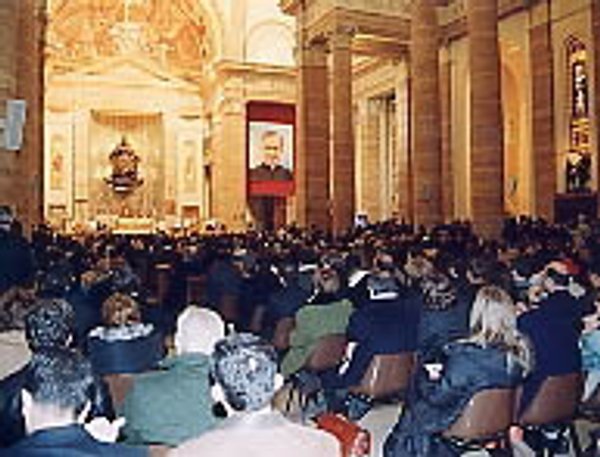“A saint within reach of everyone, the saint of daily affairs,” was the way the prelate of Opus Dei described St. Josemaría in his homily, at a Mass celebrated on January 9, 2003 in the Basilica of San Eugenio. The Mass, which was attended by several thousand people, marked the end of a year’s worth of activities commemorating the centennial of St. Josemaría Escrivá’s birth in Spain on January 9, 1902.
Academic events and service projects during the centennial

To kick off the centennial year, the Pontifical University of the Holy Cross organized an international congress, “The Grandeur of Ordinary Life,” which was held in Rome from January 8 to 12, 2002. The congress was attended by 1,200 people from 57 countries, and focused on studying the family, development, education and other issues in light of the message of Josemaría Escrivá. In addition to a number of addresses, the congress featured more than one hundred conferences and roundtables.
During the centennial year, people in various countries initiated service projects for the purpose of improving others’ material conditions and helping them come closer to God. These initiatives included, among others:

- The Institute for Industrial Technology (Lagos, Nigeria)
- Moluka Medical-Social Clinic (Kinshasa, D.R. Congo)
- Guatanfur Farm School (Temza, Colombia)
- Anauco Medical Clinic (Caracas, Venezuela)
- Los Pinos Educational Center (Montevideo, Uruguay)
- Centennial Medical Unit (Monterrey, Mexico)
- Braval Occupational Program for Immigrants (Barcelona, Spain) and
- Laguna Care Center (Madrid, Spain).
Marta Manzi, spokesperson for the centennial activities committee, summed up the initiatives: “These institutions are intended to be a permanent and visible sign of the celebration of the centennial.”
In a similar vein, the Josemaría Escrivá canonization organizing committee sponsored Project Harambee 2002, a solidarity fund for educational programs in Africa. Information about the progress of the project can be found at www.harambee2002.org.
Throughout 2002, congresses, conferences and symposia took place in various countries to consider the teachings of Josemaría Escrivá. Some examples were:

- “The Christian in the Secular World” (Washington)
- “Work, Path to Sanctity” (Abidjan, Ivory Coast)
- “Central European Congress for the Centennial of Josemaría Escrivá’s Birth” (a multi-part congress that was held successively in Vienna, Prague, Bratislava, Budapest and Zagreb)
- “The Social Doctrine of the Church and of Blessed Josemaría Escrivá” (Naples)
-“Holiness in the Third Millenium, a Challenge Within Reach of All” (Fatima, Portugal)
-“The Christian Materialism of Josemaría Escrivá” (Brussels)
-“Towards a More Human Education” (San José, Costa Rica) and
-“Two Cities: Temporal and Spiritual” (at the UNESCO headquarters in Paris).
In the English-speaking world, conferences were organized in Boston, Chicago, Miami, Minneapolis, Montreal, Nairobi, New York, Ottawa, San Francisco, St. Louis, Sydney, Toronto, Vancouver, and Washington, among other places.
Exhibitions and other centennial initiatives

In January 2002 an exhibition on Josemaría Escrivá was set up in the basilica of Notre Dame des Victoires in Paris, featuring posters, videos, books and other documents. The exhibition then traveled to Aix-in-Provence, Marseilles, Bordeaux and Strasburg. Similar exhibitions were on display in Abidjan, Chicago, Hong Kong, London, Macao, Madrid, Manila, Melbourne, and many other cities.
A critical historical edition of The Way was published in Spain in the centennial year. This is Josemaría Escrivá’s best-known book, with more than four million copies in 45 languages published. In December of 2002 the first Guaraní-Spanish edition of The Way was unveiled in Paraguay. Special centennial editions of St. Josemaría’s works were issued by various publishers around the world. A website featuring the published writings of the new saint also came on-line, www.escrivaworks.org.
